- Home
- Vasily Grossman
Life and Fate Page 4
Life and Fate Read online
Page 4
Just as much of Life and Fate can be read as a series of miniatures, so Chekhov’s stories – in Grossman’s view – can be read as a single epic. And the tribute one of Grossman’s characters pays to Chekhov is a statement of Grossman’s own hopes and beliefs: ‘Chekhov brought Russia into our consciousness in all its vastness – with people of every estate, every class, every age. More than that! It was as a democrat that he presented all these people – as a Russian democrat . . . Chekhov said, let’s put God – and all these grand progressive ideas – to one side. Let’s begin with man; let’s be kind and attentive to the individual man – whether he’s a bishop, a peasant, an industrial magnate, a convict in the Sakhalin Islands or a waiter in a restaurant. Let’s begin with respect, compassion and love for the individual – or we’ll never get anywhere.’41
Life and Fate could perhaps be called a Chekhovian epic about human nature; like any great epic, it occasionally shatters its own frame. On the train to the death camp, Sofya Osipovna Levinton, a middle-aged, childless doctor, ‘adopts’ David, a small boy to whom Grossman has given many of his childhood memories as well as his own birthday, December 12. Refusing to abandon either David or the Jewish people with whom she is identifying for the first time, Sofya sacrifices her life by not responding when a German officer orders any doctors and surgeons to come forward. Sofya and David are among the crowd propelled into the gas chambers. David dies first and Sofya feels his body subside in her arms. The chapter ends:
This boy, with his slight, bird-like body, had left before her.
‘I’ve become a mother,’ she thought.
That was her last thought.
Her heart, however, still had life in it: it contracted, ached and felt pity for all of you, both living and dead; Sofya Osipovna felt a wave of nausea. She pressed David, now a doll, to herself; she became dead, a doll.’42
As she dies, Sofya Osipovna feels the power of maternal feelings for the first time. She has become a mother – but has she borne her child into life or into death? We cannot say: David is dead, but David/Vasily is still alive – and Sofya herself must also, in some sense, be alive because her heart feels pity not only for the dead and the dying, not only for her contemporaries, but for ‘all of you’, that is, for us readers. She has, perhaps, borne Vasily Grossman – and perhaps some of his readers – into a life that will be fuller and deeper, if no less painful.
As he said in a letter to Ehrenburg about the Black Book, Grossman felt it his moral duty to speak on behalf of the dead, ‘on behalf of those who lie in the earth’.43 What is no less important, however, is that he felt sustained by the dead; he believed that their strength could help him to fulfil his duty towards the living. This is clear from the guardedly optimistic conclusion to the story of Viktor Shtrum. After uncharacteristically betraying men he knows to be innocent, after agreeing to sign a slanderous official letter merely because he can’t bear the thought of losing a few new privileges, Shtrum expresses the hope that his dead mother will help him to act better another time; his last words in the novel are ‘Well then, we’ll see (. . .) Maybe I do have enough strength. Your strength, Mother . . .’44
Grossman’s feelings are revealed still more clearly in the letter he wrote to his mother on the twentieth anniversary of her death: ‘I am you, my dearest. As long as I am alive, then you are alive too. And when I die, you will continue to live in this book, which I have dedicated to you and whose fate is similar to your own fate.’45 His sense of his mother’s continued life in the book seems to have made him feel that Life and Fate was itself a living being. His letter to Khrushchev ends with a challenge: ‘There is no sense or truth in my present position, in my physical freedom while the book to which I dedicated my life is in prison. For I wrote it, and I have not repudiated it and am not repudiating it. (. . .) I ask for freedom for my book.’46
John Garrard, co-author with his wife Carol of The Bones of Berdichev, has written to me about what he calls ‘two open wounds’ relating to Grossman: ‘The first is the culture of silence that exists to this day in former Soviet territory about the collaboration among some of the local population in the deaths of Soviet Jews. Last month I heard from an American Peace Corps volunteer assigned to Berdichev. She was trying to locate the massacre sites. When she asked her Ukrainian friends (and she speaks Ukrainian) for help, they looked at her blankly and denied the existence of any such massacres, and any such pits. The second relates to the Battle of Stalingrad. In huge granite letters on the wall leading to the famous Stalingrad mausoleum a German soldier asks, “They are attacking us again; can they be mortal?” Inside the mausoleum the words of a Red Army soldier’s reply are tooled in gold: “Yes, we were mortal indeed, and few of us survived, but we all carried out our patriotic duty before holy Mother Russia.” Although these words are taken from “In the Line of the Main Drive”, an article first published by Grossman in Red Star and reprinted in Pravda, the designers of the memorial did not acknowledge Grossman as their author. Guides at the memorial still claim that they do not know who wrote those words.’47
While the memorial was being constructed, Grossman died in obscurity. The memorial was begun in 1959 and completed in 1967; Life and Fate was ‘arrested’ in 1961 and Grossman died in 1964. It is as if the authorities chose to deal with Grossman by splitting him into two separate figures: a dissident Jew whose work must be silenced, and a ‘voice of the Soviet people’ whose words could be carved in huge letters provided his name went unmentioned. The absence of any acknowledgment to Grossman inside the mausoleum is, of course, shameful. Grossman himself, however, would probably just shrug his shoulders; what would upset him more is people’s reluctance to attend to what he has said ‘on behalf of those who lie in the earth’.
Robert Chandler, June 2006 (revised November 2010)
1 Primo Levi, perhaps the greatest Western witness to the Shoah, worked throughout his life as an industrial chemist. Like Grossman, he is a master of precise description and analysis.
2 The title is derived from the German Glück auf. This phrase, literally ‘Luck Up!’, was used to greet a miner when he was brought up to the surface. It is used more generally to mean ‘Good Luck!’.
3 Tzvetan Todorov, Hope and Memory (London: Atlantic Books, 2005), p. 50.
4 Semyon Lipkin, Kvadriga (Moscow: Knizhny sad, 1997), p. 516.
5 Ibid., p. 577.
6 During its second congress in 1903, the Russian Social Democratic Party split into two factions, which became known as ‘Bolsheviks’ and ‘Mensheviks’. After the Bolshevik coup d’état in 1917, most Mensheviks were either arrested or exiled.
7 The Soviet security service was renamed many times; the most important of its names and acronyms, in chronological order, are the Cheka, the OGPU, the NKVD and the KGB.
8 For a fuller account of this story, including Grossman’s astutely phrased letter to Yezhov, see John & Carol Garrard, The Bones of Berdichev (New York: The Free Press, 1996), pp. 122–25 and pp. 347–48.
9 Lipkin, op. cit., p. 518. Todorov is wrong to reproach Grossman, if only implicitly, [Todorov, op. cit., p. 50] for not trying to defend Boris Guber as well; any such attempt would have led not only to Grossman himself being arrested but also to Olga Mikhailovna staying in prison.
10 Ilya Ehrenburg, Grossman’s fellow – and rival – war correspondent, has often been seen as unprincipled. Ehrenburg, however, not only refused to sign this letter but even wrote to Stalin explaining his refusal. Shtrum’s ambivalent feelings towards Sokolov in Life and Fate are Grossman’s ambivalent feelings towards Ehrenburg [Jonathan Brent and Vladimir P. Naumov, Stalin’s Last Crime: The Plot against the Jewish Doctors, 1948–1953, pp. 300–306]. My thanks to Alice Nakhimovsky for pointing this out to me [personal correspondence].
11 For a fuller account of this painful episode see Vasily Grossman The Road (London: MacLehose Press, 2010), pp. 75–78.
12 Vasily Grossman, Life and Fate, p. 656.
13 Lipkin, op. cit., p. 572.
>
14 Vasily Grossman, The Road, p. 291.
15 La Dernière Lettre, a one-woman play based on this letter, was staged in Paris by Frederick Wiseman in 2000; Wiseman went on to make a film based on this production. He then staged The Last Letter in New York in December 2003. A Russian version was staged in Moscow in December 2005, on the centenary of Grossman’s birth.
16 Frank Ellis, Vasiliy Grossman: The Genesis and Evolution of a Russian Heretic (Oxford/Providence: Berg, 1994), p. 48.
17 Vasily Grossman, A Writer at War: Vasily Grossman with the Red Army, 1941–1945, ed. Antony Beevor & Luba Vinogradova (London: Harvill Secker, 2005) p. 126. The Radiant Way is the title of a film directed by Aleksandrov (1940).
18 Ibid. p. xiv.
19 Ibid, p. 62.
20 The Road, pp. 68–70
21 ‘The Old Teacher’, Znamya (1943, issues 7 & 8); ‘Ukraine without Jews’, Eynikayt, 25 Nov & 2 Dec 1943.
22 The Road, p. 144.
23 The plates for the Soviet edition were destroyed in 1948. See Yitzhak Arad, The Holocaust in the Soviet Union (Lincoln/Jerusalem: University of Nebraska Press/Yad Vashem, 2009) p. 543. The complete Russian text of The Black Book was published in Israel in 1980, in Kiev in 1991, and in Vilnius in 1993. A separate volume, The Unknown Black Book (Neizvestnaya Chornaya Kniga) containing not only material from The Black Book but also material previously rejected for censorship reasons was published in Moscow in 1993 and in the USA in 2008.
24 The OGPU confiscated two copies of the manuscript of A Dog’s Heart during a search of Bulgakov’s flat in May 1926; two years later, however, they were returned. Grossman himself always spoke of Life and Fate being ‘arrested’; other Russians discussing the incident tend to use the same word.
25 Pasternak, in contrast, showed copies of Doctor Zhivago to friends and editors and even trusted the manuscript to the Soviet postal service; his offence lay not in writing the novel but in publishing it abroad.
26 Garrard & Garrard, op.cit., pp. 263–65.
27 Korney Chukovsky, Diary 1901–1969 (New Haven & London: Yale University Press, 2005), p. 451.
28 It is unclear whether he made this copy before or after the warnings from Lipkin and Zabolotskaya.
29 Index on Censorship (London), 1985, vol.5, pp. 9–10. This article is an edited translation of the speech at the 1984 Frankfurt Book Fair during which Voinovich said that it was he who, in 1970, smuggled Life and Fate to the West. The two microfilms, it emerged later, were made with the help of Andrey Sakharov and Yelena Bonner.
30 Lipkin, op.cit., p. 582.
31 Ibid, p. 575.
32 14 September was also Grossman’s and Olga Mikhailovna’s wedding anniversary, a fact that must, for Grossman, have been a painful reminder of his wife’s antipathy towards his mother and its tragic consequences. His daughter Yekaterina Korotkava has informed me that Grossman died of lung cancer – not, as has often been said, of stomach cancer.
33 Garrard & Garrard, op. cit., p. 239.
34 Life and Fate, pp. 781–82.
35 Ibid, p. 512.
36 Ibid, p. 825.
37 The number of Jews initially thought to have died at Berdichev. The correct figure is proably closer to 12,000.
38 Ibid. p. 390–94
39 For Grossman’s conversation with a non-fictional Khristya Chunyak, see A Writer at War, p. 253. As he often does, Grossman is commemorating a real person who has impressed him.
40 In Russian, ‘khozyaika dobroy khaty’: another of Grossman’s fragments of poetry.
41 Life and Fate, p. 267.
42 Life and Fate, p. 538. I have revised my translation of the paragraph beginning, ‘Her heart . . .’. I am grateful to Harriet Murav for gently pointing out the inadequacy of my original translation of this paragraph in her article, ‘Responding to the Holocaust: Bergelson, Grossman, and der Nister’. A Russian version of this was published in Istoriia i kul’tura rossiiskogo i vostochnoevreiskogo evreistva: Novye istochniki, novye podkhody, ed. O. V. Budnitsky. (Moscow: Dom evreiskoi knigi, 2006).
43 Garrard & Garrard, ibid, p. 206.
44 Life and Fate, p. 825.
45 The Road, p. 293.
46 Fyodor Guber, Pamyat’ i pis’ma (Moscow: Probel, 2007), p. 102.
47 See John Garrard’s article about Grossman in Encyclopedia of Europe 1914–2004 (New York: Scribner, 2006).
Historical Background
In 1939 Stalin signed his non-aggression pact with Hitler. Hitler and Stalin divided up Poland, and the Second World War began. Throughout the first half of 1941 Stalin ignored all warnings about Hitler’s intentions. As a result, the Soviet armed forces were taken unawares by the German invasion of June 22, 1941; whole armies of up to a million men were encircled. By late October the Germans had taken three million prisoners, isolated Leningrad and breached the outer defences of Moscow. Meanwhile, more than 1500 factories, as well as whole universities and scientific institutes, had been evacuated to the Urals, Siberia, the Volga and Central Asia.
The first significant Soviet success was Zhukov’s defence of Moscow in December 1941. During most of 1942, however, the Germans held their ground in the north and centre, while advancing through the Ukraine towards the Volga and the oil fields of the Caucasus. By September 1942 they were laying siege to Stalingrad, the key industrial and communications centre on the Volga. It is at this point that Life and Fate begins.
For the main part, Life and Fate is historically accurate. As in War and Peace, a number of real historical figures appear – most of the senior Russian and German officers at Stalingrad, as well as Stalin and Hitler. Colonel Novikov is based on the tank commander, Babadzhanyan, who later became a Marshal of the Soviet Union. Some of the minor characters in Berdichev are based on people Grossman knew; others are derived from his researches for the Black Book. Viktor Shtrum is Grossman’s self-portrait: his growing consciousness of his Jewish roots, his feelings towards Stalin, his agonies over whether or not to capitulate to the authorities, his difficult marriage and his love affair with a friend’s wife – all these are based on Grossman’s own life. Grossman, however, has given some of his more positive experiences to Major Byerozkin, the one character in the novel who enjoys consistently good fortune. Like Byerozkin, Grossman once watched a grenade land between his feet and fail to explode. This was only one of several occasions when he was extraordinarily lucky to escape with his life; it was not for nothing that his wartime colleagues sometimes called him ‘Lucky Grossman’.
In more superficial respects Shtrum is based on Lev Landau, a physicist who was dismissed from his work during the anti-Jewish campaign of the early 1950s only to be reinstated by Pyotr Kapitsa, an ex-student of the British Nobel prize-winner, Ernest Rutherford. Kapitsa, at least in his refusal to work on developing the atom bomb, is a model for Grossman’s Chepyzhin.
One inaccuracy in the novel is a chronological one. Official Soviet anti-Semitism gathers strength more quickly in the world of the novel than it did in reality. The letter Shtrum signed in 1942 is a fictional equivalent of the one Grossman signed in 1952; and official vilification of Einstein dates not from 1942 but from the end of the 1940s. In this respect, Grossman seems to have considered symbolic truth (Stalin snatching the sword of anti-Semitism from Hitler’s hands at Stalingrad) more important than historical accuracy.fn1
There is also the vexed question of what motivated the defenders of Stalingrad. Grossman is relatively orthodox in his view that, as in 1812, there was a spontaneous upsurge of Russian patriotism. An alternative view is that the city was defended by crazed men whose only choice was between being shot by the NKVD if they deserted and being shot by the Germans if they did not desert. To say, as Grossman does, that ‘the soul of wartime Stalingrad was freedom’, may be a simplification.
Footnotes
fn1It should be noted, however, that Ilya Ehrenburg, always sensitive to changes in the political climate, spoke as early as February 1943 about the need to counter the rise of anti-Semitism in
the country [Simon Markish, ‘A Russian Writer’s Jewish Fate’ in Commentary, April 1986, p. 42]. And he complained soon after this about references to Jewish suffering being cut from his articles. [Vasily Grossman, A Writer at War, p. 243.]
The Text and the Translation
The first Russian edition of Life and Fatefn1, on which this translation is based, contains several lacunae, indicated here by a bracketed ellipsis [ . . .].
I myself chose to omit or abridge a small number of passages. Grossman never had the opportunity to revise the manuscript for publication and his style is occasionally repetitive. My hope was that these omissions, which amount to around six pages, would allow the clarity and power of Grossman’s thought to stand out more clearly. For this new (Vintage, 2006) edition of Life and Fate I have also corrected about a dozen minor errors and reinstated several phrases of Yiddish, which I had unthinkingly translated into English. Grossman’s occasional uses of Yiddish are, of course, significant.

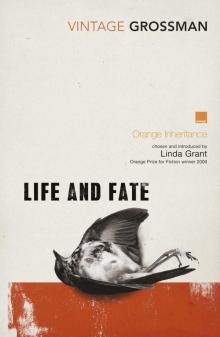 Life and Fate
Life and Fate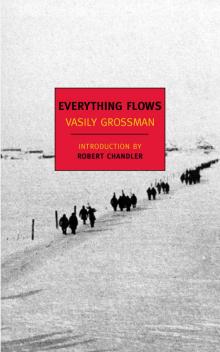 Everything Flows
Everything Flows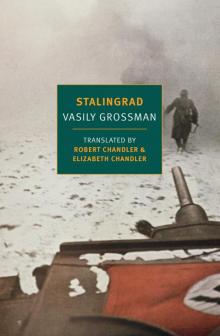 Stalingrad
Stalingrad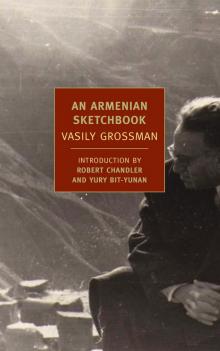 An Armenian Sketchbook
An Armenian Sketchbook The Road
The Road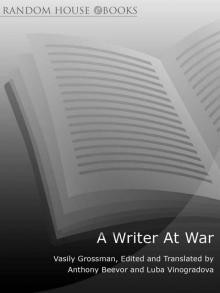 A Writer at War
A Writer at War